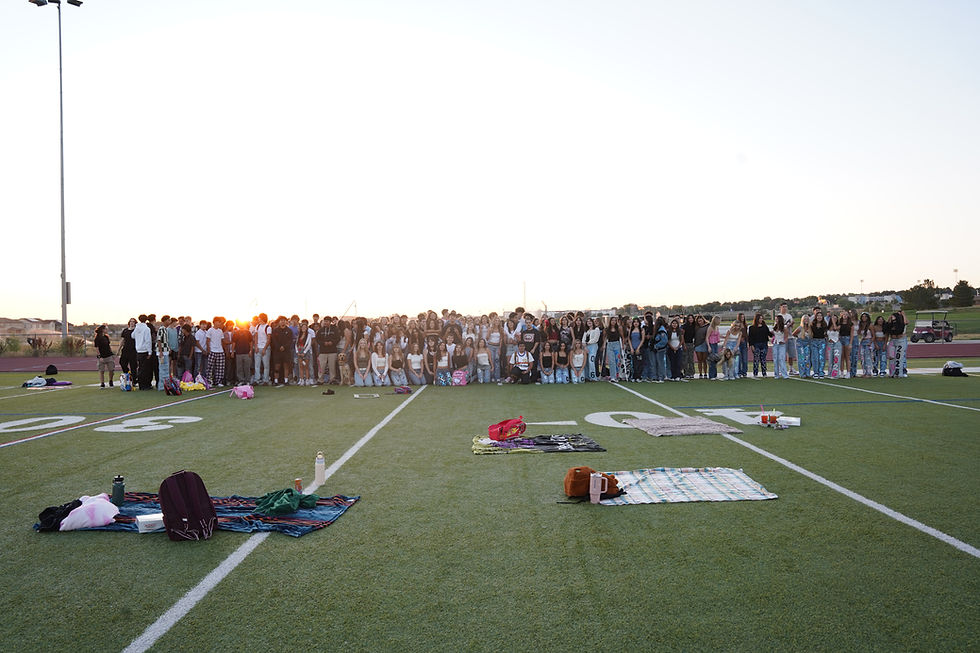Behind the scenes of cheerleading
- The Range Staff

- Nov 7, 2023
- 4 min read
Updated: Nov 8, 2023
by Nevaeh L.

Cheerleaders are always peppy, happy, excited, and smiling. But what if it was an act? While it is fun, there is an unseen side that cheerleaders are not supposed to talk about. Cheerleaders are taught to “fake it till you make it”. They are trained on how to act, talk, and behave in front of crowds of people. Some athletes are questioning if all of the hours of practice, all of the money, all of the injuries, and all of the stress about being and looking perfect are worth it.
A group of cheerleaders and coaches at Mountain Range High School were interviewed and asked to talk about the good and the bad things that they have experienced while in cheerleading, both at MRHS and in club cheer squads. Cheerleading is a wonderful sport, and the participants all do it for a reason. However, due to fear of repercussions the students, athletes, and coaches interviewed have asked to not have their names revealed in their interviews.
A senior on the cheer squad shared this comment: “I have been in cheerleading since I was in third grade. My least favorite part of cheerleading is tumbling. When I was around 9 I injured my back trying to tumble, and it has never been the same since. It’s just hard because of all of the pressure to look and perform a certain way, and with all of the outside hours it is a lot to balance as a student as well.” All that people see when the cheerleaders are performing is their polished routine and their practiced smiles. They don’t see the injuries or late nights of studying after hours of practice.
Another squad member, this one a junior, shared a similar sentiment: “My favorite part of cheer is being around all of my friends almost all of the time, and I also love the feeling of hitting a new skill that you and your team have been trying for a long time. My least favorite aspect of cheerleading is all of the stress that it causes. For the entirety of competition season everyone is always stressed out, nervous, and flustered. It is just always so constantly demanding, physically and mentally and oftentimes leaves me feeling completely drained. Cheer has been harmful in more ways than one. I’ve been injured multiple times, but the worst pain is the mental pain. I’m constantly trying to be the best I can be, so when I encounter a skill that I cannot do, it just makes me feel weak and worthless. It is a blessing and a curse. I learned basic social skills and came out of my shell more than I ever have and have met my best friends in the whole world. It gave me a home away from home.”
There seems to be a reoccurring theme here throughout the interviews with cheer causing stress, strain on bodies, and the effects it has on mental health. “I have been cheering for 11 years, and my least favorite part of cheer is when people think that it is not a sport, or that it is easy. Cheer has been not only physically but also mentally harmful to me. There is a huge priority of appearance that has negatively affected my mental health. Not only do you have to maintain a ‘perfect appearance’ but also when you are a flier you have to worry about being light or small enough to be lifted and thrown. The overall attitude towards body size and weight is awful. I constantly worry about my size. Cheerleading has taught me that even if something is hard at first, if you keep working hard you will be able to succeed. However in the same breath, working towards hard goals can leave you feeling exhausted and hopeless. You always want to be a good cheerleader so bad not only for yourself but also for your team, that you forget to be patient with yourself.” The stereotypes around cheerleading can be frustrating for all of the athletes because it diminishes all of the hours of hard work that they put into everything that they do.
Even with coaches, the mental effects are draining, and it’s not just the athletes that feel the pressure: “I was a cheerleader from age 5 all the way through college at the University of New Hampshire. Throughout my career as a cheerleader I experienced many coaches who did not respect my individuality and tried to make me a person I was not. This happened because I was not the ‘stereotype cheerleader’. I found that if I changed my image to match the person they wanted me to be I was treated better. This caused me to experience eating disorders, body image issues and an inner critic that pushed for perfection in all aspects of my life.”
Coaches not only have to worry about the wellbeing of their athletes, but also what other coaches are going to think or say, and trying to win over the athletes parents with their decisions. It is a lot to handle.
Throughout the ups and downs of the season, all of the hard work, all of the long nights and practices, and all of the money every single one of the people interviewed said that they would recommend for others to join cheer. Although it can be hard, it is worth it to have a second family and to physically see hard work pay off.






